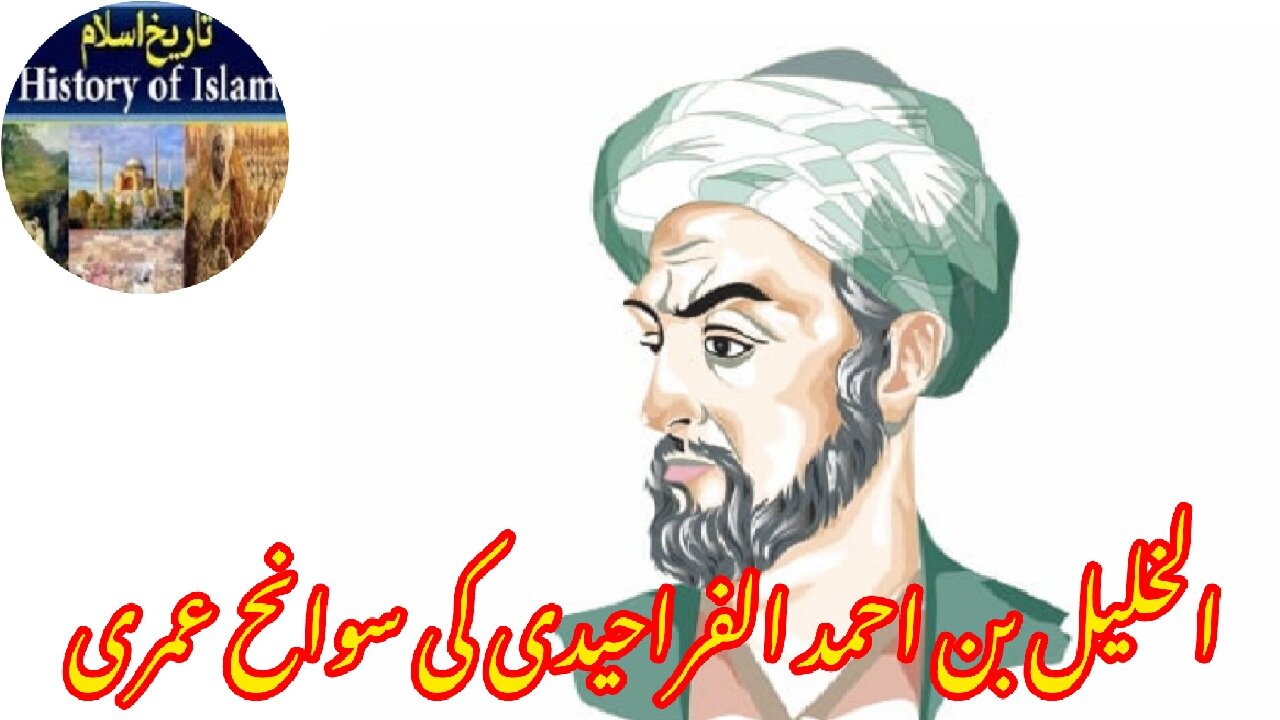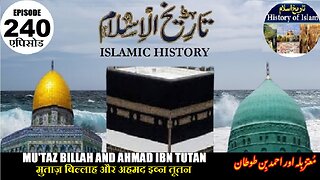Premium Only Content

Biography of Al-Khalil bin Ahmed Al-Farahidi سوانح حیات الخلیل بن احمد الفراحیدی
@islamichistory813 #alkhalilibnahmadalfarahidi #biography #islamichistory #islamicscholars #islam #history #scholars #hadith #quran #sunnah #islamic #legacy #heritage #wisdom #fiqh #knowledge #tafsir #faith #guidance #islamicworld #muslim #islamiclegacy #imams #islamiccivilization #goldenage #truth #ummah
Biography of Al-Khalil ibn Ahmad al-Farahidi
Asslamoalaikum, We welcome you in our series Muslim Heritage and Islamic Scholars, today we will describe Biography of Al-Khalil ibn Ahmad al-Farahidi
Biography of Al-Khalil bin Ahmad Al-Farahidi
Al-Khalil bin Ahmad Al-Farahidi, one of the greatest scholars of the Islamic Golden Age, was a renowned philosopher, lexicographer, and grammarian from Basra, Iraq. He was born in 718 CE (100 AH) in Amman, a region that was then a major center of Arab culture and Islamic scholarship. From an early age, Al-Khalil demonstrated exceptional intelligence and a dedication to learning. His passion for language and knowledge led him to migrate to Basra, one of the intellectual capitals of the Muslim world, where he immersed himself in the study of the Arabic language, poetry, and grammar.
Al-Khalil became one of the most respected figures of the Basran School of Grammar, a tradition that shaped the Arabic language for centuries. His greatest achievement was the compilation of Kitab al-Ayn, the first dictionary of the Arabic language. This monumental work is not alphabetical, as modern dictionaries are, but rather by the phonetic system of the letters, starting from deep throat sounds to sounds emitted by the lips. Through this work, Al-Khalil not only preserved the vast treasury of Arabic words but also laid the foundation for lexicography as a poem. His method highlighted his genius in organizing the language.
Another area in which Al-Khalil excelled was Arabic production (arood). He was the first to establish the rules of Arabic poetic meters, identifying and organizing them so that poets could write with precision and scholars could analyze them with accuracy. This contribution was so revolutionary that no poet or literary scholar after him could ignore his system. For this reason, he is often referred to as the founder of Arabic prosody.
In grammar, al-Khalil was the teacher of some famous scholars, including Sabwih, author of the famous book Al-Kitab which remains the most authoritative grammar of the Arabic language. Al-Sabwih himself acknowledged that much of his knowledge came from al-Khalil and considered him his greatest teacher and intellectual inspiration. This guidance ensured that al-Khalil's influence would continue to shape Arabic linguistics for generations.
Despite his immense contributions to knowledge, al-Khalil was known for his piety, humility, and pious lifestyle. He lived a simple life in Basra, often refusing the wealth and privileges that came with scholarly prestige. He devoted his time to teaching, writing, and worship, embodying the spirit of devotion that characterized many scholars of early Islam. His humility made him beloved among his students and respected by rulers, although he never courted the powerful.
Al-Khalil ibn Ahmad al-Farahidi died in 786 CE (170 AH) in Basra, Iraq, where he spent most of his scholarly life. According to historical reports, he died tragically in the mosque while deeply meditating on a grammar problem. His death took away one of the greatest minds in Islamic intellectual history, but his legacy lives on through his works and his students.
Regarding his shrine, historical accounts indicate that Al-Khalil was buried in Basra, the city that nurtured his scholarly career. His tomb became a place of veneration for scholars and admirers of the Arabic language. While Basra has seen several periods of destruction and upheaval over the centuries, traditions indicate that his burial place remained famous and revered by students of knowledge. Some sources mention that his tomb was also visited by later grammarians and astronomers who came to pay homage to the founder of their discipline. However, like many ancient tombs in Iraq, the exact state of his tomb has changed over time due to political and social upheavals.
Today, Al-Khalil ibn Ahmad is remembered as the founder of Arabic lexicography and prosody, a scholar who organized the beauty of the Arabic language and ensured its preservation for future generations. His Kitab al-Ayn is a monument to linguistic perfection, and his role as a teacher and mentor of the Sabwayah secures his place as one of the most influential figures in the history of the Arabic language. His tomb in Basra is a symbol of respect for lovers of knowledge and students of the Arabic heritage.
With this, we ask your permission until tomorrow and tomorrow we will narrate the biography of Abu al-Kam al-Kirmani. We will also narrate the history of his tomb. Finally, we ask Allah Almighty to grant us the ability to act on the Quran and Hadith, Ameen.
Allah Hafiz
==================================
-
 11:12
11:12
ISLAMIC HISTORY
1 day agoIslamic History Episode 240 Mutaz Billah & Ahmad ibn Tutan मुताज़ बिल्लाह معتز بلہ اور احمد بن طوطان
6 -
 7:13
7:13
China Uncensored
17 hours agoChina’s Military Is Out of Control. Can This INSANE Plan Stop It?
5.35K8 -
 1:46
1:46
WildCreatures
17 days ago $0.52 earnedButterfly risks its life to drink crocodile tears in the Pantanal
5.13K5 -
 24:38
24:38
Professor Nez
17 hours agoTrump Just SHOOK the Democrats to the CORE with THIS MOVE!
19.8K10 -
 14:16
14:16
Actual Justice Warrior
3 days agoManhattan DA Says It's Okay To ATTACK Pro Life Activists
20.4K29 -
 5:31
5:31
Buddy Brown
1 day ago $3.79 earnedJames Comey Forgot This Video EXISTS! | Buddy Brown
24.4K12 -
 20:47
20:47
James Klüg
1 day agoAsking Democrats What Ended The Border Crisis Vol. 3
21.8K32 -
 18:09
18:09
Forrest Galante
1 day agoI Survived 24 Hours In The World's Deadliest Jungle
171K21 -
 15:23
15:23
GritsGG
15 hours agoBad Start Leads to Ultimate Warzone Victory w/ Bobby Poff!
12.5K1 -
 2:03:56
2:03:56
Side Scrollers Podcast
20 hours agoSmash Pro DEMANDS “Woke Echo Chamber” + EA SOLD To Saudis + More | Side Scrollers
54K9